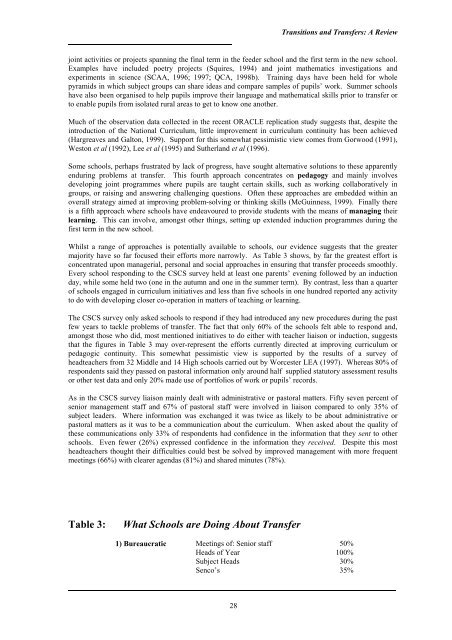The Impact of School Transitions and Transfers on Pupil Progress and Attainment
The Impact of School Transitions and Transfers on Pupil Progress and Attainment
The Impact of School Transitions and Transfers on Pupil Progress and Attainment
You also want an ePaper? Increase the reach of your titles
YUMPU automatically turns print PDFs into web optimized ePapers that Google loves.
<str<strong>on</strong>g>Transiti<strong>on</strong>s</str<strong>on</strong>g> <str<strong>on</strong>g>and</str<strong>on</strong>g> <str<strong>on</strong>g>Transfers</str<strong>on</strong>g>: A Review<br />
joint activities or projects spanning the final term in the feeder school <str<strong>on</strong>g>and</str<strong>on</strong>g> the first term in the new school.<br />
Examples have included poetry projects (Squires, 1994) <str<strong>on</strong>g>and</str<strong>on</strong>g> joint mathematics investigati<strong>on</strong>s <str<strong>on</strong>g>and</str<strong>on</strong>g><br />
experiments in science (SCAA, 1996; 1997; QCA, 1998b). Training days have been held for whole<br />
pyramids in which subject groups can share ideas <str<strong>on</strong>g>and</str<strong>on</strong>g> compare samples <str<strong>on</strong>g>of</str<strong>on</strong>g> pupils’ work. Summer schools<br />
have also been organised to help pupils improve their language <str<strong>on</strong>g>and</str<strong>on</strong>g> mathematical skills prior to transfer or<br />
to enable pupils from isolated rural areas to get to know <strong>on</strong>e another.<br />
Much <str<strong>on</strong>g>of</str<strong>on</strong>g> the observati<strong>on</strong> data collected in the recent ORACLE replicati<strong>on</strong> study suggests that, despite the<br />
introducti<strong>on</strong> <str<strong>on</strong>g>of</str<strong>on</strong>g> the Nati<strong>on</strong>al Curriculum, little improvement in curriculum c<strong>on</strong>tinuity has been achieved<br />
(Hargreaves <str<strong>on</strong>g>and</str<strong>on</strong>g> Galt<strong>on</strong>, 1999). Support for this somewhat pessimistic view comes from Gorwood (1991),<br />
West<strong>on</strong> et al (1992), Lee et al (1995) <str<strong>on</strong>g>and</str<strong>on</strong>g> Sutherl<str<strong>on</strong>g>and</str<strong>on</strong>g> et al (1996).<br />
Some schools, perhaps frustrated by lack <str<strong>on</strong>g>of</str<strong>on</strong>g> progress, have sought alternative soluti<strong>on</strong>s to these apparently<br />
enduring problems at transfer. This fourth approach c<strong>on</strong>centrates <strong>on</strong> pedagogy <str<strong>on</strong>g>and</str<strong>on</strong>g> mainly involves<br />
developing joint programmes where pupils are taught certain skills, such as working collaboratively in<br />
groups, or raising <str<strong>on</strong>g>and</str<strong>on</strong>g> answering challenging questi<strong>on</strong>s. Often these approaches are embedded within an<br />
overall strategy aimed at improving problem-solving or thinking skills (McGuinness, 1999). Finally there<br />
is a fifth approach where schools have endeavoured to provide students with the means <str<strong>on</strong>g>of</str<strong>on</strong>g> managing their<br />
learning. This can involve, am<strong>on</strong>gst other things, setting up extended inducti<strong>on</strong> programmes during the<br />
first term in the new school.<br />
Whilst a range <str<strong>on</strong>g>of</str<strong>on</strong>g> approaches is potentially available to schools, our evidence suggests that the greater<br />
majority have so far focused their efforts more narrowly. As Table 3 shows, by far the greatest effort is<br />
c<strong>on</strong>centrated up<strong>on</strong> managerial, pers<strong>on</strong>al <str<strong>on</strong>g>and</str<strong>on</strong>g> social approaches in ensuring that transfer proceeds smoothly.<br />
Every school resp<strong>on</strong>ding to the CSCS survey held at least <strong>on</strong>e parents’ evening followed by an inducti<strong>on</strong><br />
day, while some held two (<strong>on</strong>e in the autumn <str<strong>on</strong>g>and</str<strong>on</strong>g> <strong>on</strong>e in the summer term). By c<strong>on</strong>trast, less than a quarter<br />
<str<strong>on</strong>g>of</str<strong>on</strong>g> schools engaged in curriculum initiatives <str<strong>on</strong>g>and</str<strong>on</strong>g> less than five schools in <strong>on</strong>e hundred reported any activity<br />
to do with developing closer co-operati<strong>on</strong> in matters <str<strong>on</strong>g>of</str<strong>on</strong>g> teaching or learning.<br />
<str<strong>on</strong>g>The</str<strong>on</strong>g> CSCS survey <strong>on</strong>ly asked schools to resp<strong>on</strong>d if they had introduced any new procedures during the past<br />
few years to tackle problems <str<strong>on</strong>g>of</str<strong>on</strong>g> transfer. <str<strong>on</strong>g>The</str<strong>on</strong>g> fact that <strong>on</strong>ly 60% <str<strong>on</strong>g>of</str<strong>on</strong>g> the schools felt able to resp<strong>on</strong>d <str<strong>on</strong>g>and</str<strong>on</strong>g>,<br />
am<strong>on</strong>gst those who did, most menti<strong>on</strong>ed initiatives to do either with teacher liais<strong>on</strong> or inducti<strong>on</strong>, suggests<br />
that the figures in Table 3 may over-represent the efforts currently directed at improving curriculum or<br />
pedagogic c<strong>on</strong>tinuity. This somewhat pessimistic view is supported by the results <str<strong>on</strong>g>of</str<strong>on</strong>g> a survey <str<strong>on</strong>g>of</str<strong>on</strong>g><br />
headteachers from 32 Middle <str<strong>on</strong>g>and</str<strong>on</strong>g> 14 High schools carried out by Worcester LEA (1997). Whereas 80% <str<strong>on</strong>g>of</str<strong>on</strong>g><br />
resp<strong>on</strong>dents said they passed <strong>on</strong> pastoral informati<strong>on</strong> <strong>on</strong>ly around half supplied statutory assessment results<br />
or other test data <str<strong>on</strong>g>and</str<strong>on</strong>g> <strong>on</strong>ly 20% made use <str<strong>on</strong>g>of</str<strong>on</strong>g> portfolios <str<strong>on</strong>g>of</str<strong>on</strong>g> work or pupils’ records.<br />
As in the CSCS survey liais<strong>on</strong> mainly dealt with administrative or pastoral matters. Fifty seven percent <str<strong>on</strong>g>of</str<strong>on</strong>g><br />
senior management staff <str<strong>on</strong>g>and</str<strong>on</strong>g> 67% <str<strong>on</strong>g>of</str<strong>on</strong>g> pastoral staff were involved in liais<strong>on</strong> compared to <strong>on</strong>ly 35% <str<strong>on</strong>g>of</str<strong>on</strong>g><br />
subject leaders. Where informati<strong>on</strong> was exchanged it was twice as likely to be about administrative or<br />
pastoral matters as it was to be a communicati<strong>on</strong> about the curriculum. When asked about the quality <str<strong>on</strong>g>of</str<strong>on</strong>g><br />
these communicati<strong>on</strong>s <strong>on</strong>ly 33% <str<strong>on</strong>g>of</str<strong>on</strong>g> resp<strong>on</strong>dents had c<strong>on</strong>fidence in the informati<strong>on</strong> that they sent to other<br />
schools. Even fewer (26%) expressed c<strong>on</strong>fidence in the informati<strong>on</strong> they received. Despite this most<br />
headteachers thought their difficulties could best be solved by improved management with more frequent<br />
meetings (66%) with clearer agendas (81%) <str<strong>on</strong>g>and</str<strong>on</strong>g> shared minutes (78%).<br />
Table 3: What <str<strong>on</strong>g>School</str<strong>on</strong>g>s are Doing About Transfer<br />
1) Bureaucratic Meetings <str<strong>on</strong>g>of</str<strong>on</strong>g>: Senior staff<br />
Heads <str<strong>on</strong>g>of</str<strong>on</strong>g> Year<br />
Subject Heads<br />
Senco’s<br />
28<br />
50%<br />
100%<br />
30%<br />
35%


